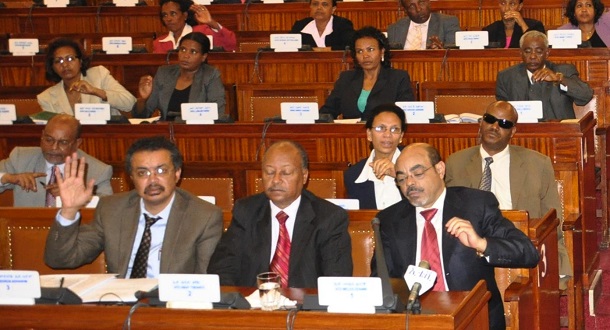A colonial-era agreement had given Egypt and Sudan rights to the Nile water, with Egypt taking 55.5 billion cubic metres and Sudan 18.5 billion cubic metres.
The new Nile River Co-operative Framework Agreement is an accord already signed by five other Nile-basin countries including Rwanda, Tanzania, Uganda, Kenya and Burundi in their respective countries.
The agreement is believe to be the product of long negotiations to replace the 1929 treaty written by Britain that awarded Egypt veto power over any project involving the Nile upstream countries.
This new agreement by the Ethiopian government would establish a permanent body to oversee the river Nile management, according to local reporters.
The move comes amid growing tensions with Egypt over Ethiopia’s plans for a hydroelectric dam on the Blue Nile compelling President Mohammed Morsi to say that Egypt did not want war but would not allow Egypt’s water to be violated.
But the Ethiopian government has stated clearly that it would not bow to the Egyptian pressure over building the hydro dam since the dam is not going to affect Egypt in anyway.
Government spokesman Bereket Simon told reporters in capital Addis Ababa that it was a step in right direction for Ethiopia to sign the new treaty since all the upstream countries have done so.
“Most of the upstream countries have approved it through their parliaments; we delayed it as a gesture of goodwill to the people of Egypt until a formal elected government was in place.
“We have a principled stance on the construction of dams. We are determined to see our projects brought to completion’’, Mr. Simon added.
Ethiopia started diverting the flow of the Blue Nile in preparation for the building of the Great Ethiopian Renaissance Dam of $4.2bn hydroelectric power which will be the biggest in Africa if completed.
The Blue Nile is one of two major tributaries of the Egyptian Nile and Egypt considers the building of the dam by the Ethiopians as a threat that will reduce the water level of the Nile which the Egyptians heavily depend on.
Ethiopia reportedly summoned the Egyptian ambassador last week to answer some questions, after politicians in Cairo were caught unaware on state television suggesting military action or supporting Ethiopian rebels to destabilize Ethiopia in an attempt to disrupt the building of the dam.
The African Union has urged dialogue and co-operation between Ethiopia, Egypt and Sudan over the Nile since they are members of the Union with a common goal.
Ethiopia’s decision to construct the dam challenges a colonial-era agreement that had given Egypt and Sudan rights to the Nile water, with Egypt taking 55.5 billion cubic metres and Sudan 18.5 billion cubic metres.
If the dam is completed, it will be a Grand Ethiopian Renaissance which would be Africa’s largest dam ever in the history of the African Continent.
The dam is expected to produce 6,000 megawatts of power and its reservoir is scheduled to start filling next year.
Issaka Adams / NationalTurk Africa News
[adrotate banner=”64″]



